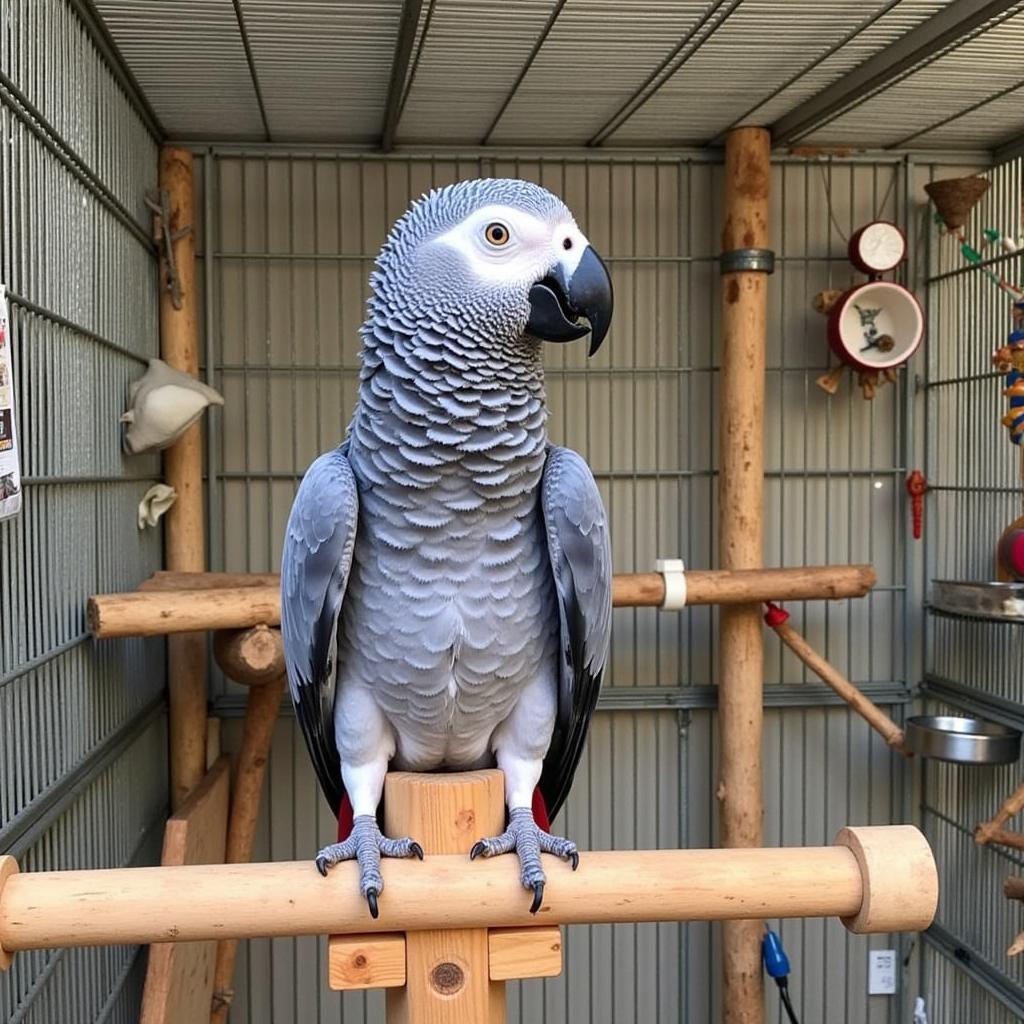The Ultimate Guide to African Gray Care
Owning an African gray parrot is a rewarding experience, but it comes with a significant responsibility. Proper African Gray Care requires understanding their unique needs, from dietary considerations and environmental enrichment to social interaction and veterinary care. This guide will cover everything you need to know to provide optimal care for your feathered friend.
Understanding Your African Gray’s Needs
African grays are highly intelligent and social birds, native to the rainforests of Central and West Africa. Their natural environment plays a crucial role in shaping their needs in captivity. Providing an enriching and stimulating environment mimicking their natural habitat is vital for their physical and mental well-being. This includes providing a spacious cage, a varied diet, and plenty of opportunities for social interaction and mental stimulation. Remember, a happy gray is a healthy gray. Soon after bringing your new companion home, you’ll want to schedule a check-up with an avian veterinarian. This establishes a baseline for your bird’s health and provides opportunities for preventative care. You can find helpful tips on breeding these magnificent birds at african gray parrot breeding tips.
 African Gray Parrot in a Spacious Cage
African Gray Parrot in a Spacious Cage
Diet and Nutrition for African Grays
A balanced and varied diet is crucial for your African gray’s health. Their natural diet consists of fruits, nuts, seeds, and vegetation. In captivity, their diet should primarily consist of high-quality formulated pellets, supplemented with fresh fruits, vegetables, and healthy nuts. Avoid feeding them avocado, chocolate, caffeine, and alcohol as these are toxic to birds.
What should I feed my African gray? A balanced diet includes formulated pellets, fresh fruits, vegetables, and healthy nuts.
Creating an Enriching Environment
African grays are highly intelligent birds requiring mental stimulation to thrive. Providing a stimulating environment helps prevent boredom and behavioral problems. This includes offering a variety of toys, such as puzzles, foraging toys, and destructible wood toys. Rotating the toys regularly keeps things interesting for your feathered friend. Learn more about this fascinating bird species on our african gray parrot page.
Choosing the Right Cage
The cage should be spacious enough for your African gray to move around comfortably, climb, and fully extend its wings. Ensure the bars are appropriately spaced to prevent escape or injury.
Maintaining Hygiene
Regular cleaning of the cage, food and water bowls is essential for preventing bacterial growth and maintaining your bird’s health.
What is the ideal cage size for an African gray? A spacious cage that allows the bird to fully extend its wings and move around comfortably is crucial.
Socialization and Training
African grays are highly social creatures and thrive on interaction with their human companions. Regular interaction, training, and playtime are essential for their emotional well-being. They are known for their exceptional vocal abilities, and with proper training, can learn to mimic words and phrases. If you are interested in purchasing one of these incredible birds, visit our african grey bird for sale page for more information.
Building a Strong Bond
Spending quality time with your African gray, talking to them, and engaging in interactive play strengthens the bond and promotes their emotional health.
Common Health Issues
While generally hardy, African grays are susceptible to certain health conditions like feather plucking, hypocalcemia, and Psittacine beak and feather disease (PBFD). Regular veterinary check-ups are essential for early detection and treatment. You can learn more about the Congo African Gray subspecies at our dedicated african gray congo page.
Conclusion
Providing excellent African gray care requires commitment and understanding. By addressing their dietary, environmental, social, and health needs, you can ensure your African gray lives a long, happy, and fulfilling life. Remember that providing proper care is an ongoing process of learning and adapting to your individual bird’s needs.
FAQ
- How long do African grays live? They can live up to 50-80 years in captivity.
- Are African grays good talkers? Yes, they are renowned for their exceptional talking abilities.
- What are the signs of a sick African gray? Changes in appetite, droppings, behavior, or feather condition can indicate illness.
- How often should I clean my African gray’s cage? Regular cleaning, including daily spot cleaning and weekly deep cleaning, is essential.
- What kind of toys do African grays enjoy? They enjoy a variety of toys, including puzzles, foraging toys, and destructible wood toys.
- How can I prevent feather plucking in my African gray? Providing a stimulating environment, proper nutrition, and regular interaction can help prevent feather plucking.
- Where can I find a reputable breeder? Research breeders carefully and ensure they prioritize the health and well-being of their birds.
Are you curious about the cost of an African Green Parrot?
Check out our informative article on african green parrot price.
Looking for more information on parrot care?
Explore our other helpful articles on parrot ownership and care.
When you need assistance, please contact us at Phone Number: +255768904061, Email: kaka.mag@gmail.com or visit us at Mbarali DC Mawindi, Kangaga, Tanzania. We have a 24/7 customer care team.

